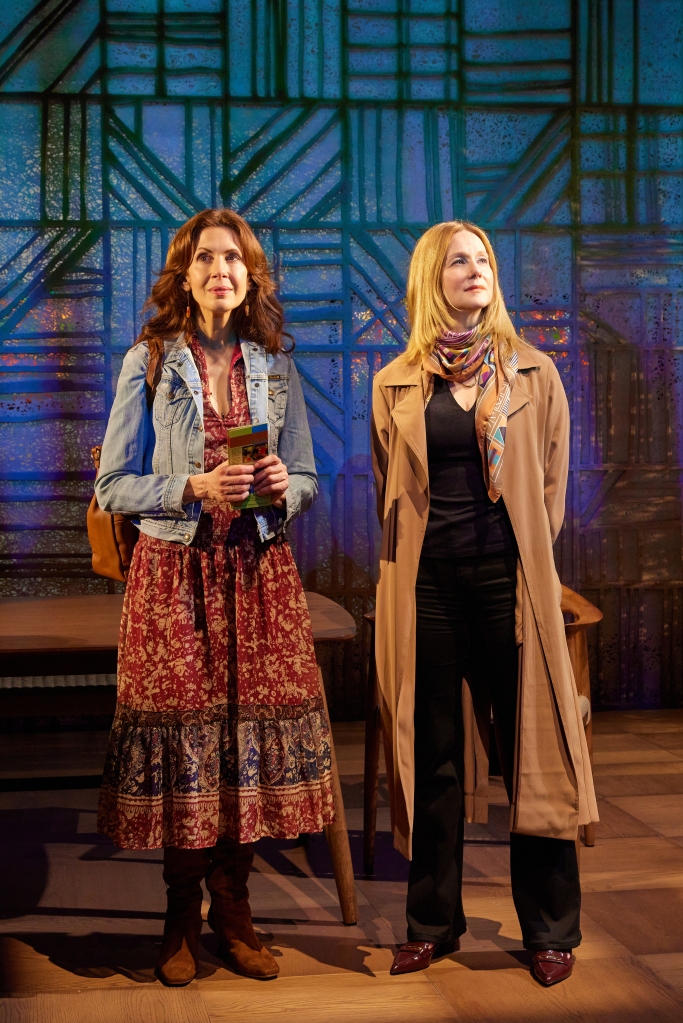Laura Linney, Jessica Hecht on Broadway
As temperatures warm up, and our temperaments improve, there is something so soothing about spending an afternoon on a sun-bathed, screened-in porch with two fabulous actresses.
And that is what David Auburn’s Broadway play “Summer, 1976,” which opened Tuesday night at the Samuel J. Friedman Theatre, generously provides — featuring the indomitable Laura Linney and Jessica Hecht.
Not that you’re outside — even if Japhy Weideman’s sparkling lights warmly make you feel like you are — or that the show is all smiles.
One hour and 30 minutes with no intermission. At the Samuel J. Friedman Theatre, 261 West 47th Street.
Diana and Alice, two women who look back on their time on Ohio State University’s campus in Columbus, Ohio, where they grew close decades earlier, are quietly unsatisfied.
The budding friends helped each other through trauma while concealing embarrassing secrets.
But the two-hander’s simply stated message, that “people aren’t just one thing,” is potently affirming, even in a play that’s apolitical and makes no attempts — as most Broadway shows do — at being epic or earth-shattering.
In a way, the story’s modesty allows emotion and meaning to suddenly sneak up on you.
And, if you’ve seen Netflix’s “Ozark,” you know that Laura Linney can be sneaky. She plays Diana, a single mother and professor with sophisticated taste in art, literature and architecture.
She claims to have “family money” and spends accordingly.
She’s also the sort of pinky-up person you initially loathe, who speaks in pretentious “jejune”s and “gestalt”s, but whose weirdness you come to appreciate and even admire.
Diana meets another mother named Alice, played by Hecht, who wears a flowy floral dress (costumes by Linda Cho) and acts a hippie even though she leads a repressed and traditional life, in a “babysitting co-op.”
In one of those insular campus life moves, university parents have formed a group that trades tokens for child-watching duties.
At first the pair sneer at each other and their picks for their daughters’ names — Gretchen and Holly — but gradually become close confidants and peel back the layers.
Auburn’s play is told mostly in monologues to the audience — only rarely do the two speak directly to each other or embody another character.
And only a few major events happen over 90 minutes.

What hits hardest, really, are small hardships — especially for Diana, as single mothers were treated even worse during the 70s than they are now.
One scene, in which a deep-feeling Hecht helps Linney’s character through a paralyzing migraine is a stunner.
The actresses are an ideal pairing of personality. Linney brings her ability to be both uncommonly kind and cutthroat to mysterious Diana, while Hecht’s expressive voice wavers from quirky to agonized.
The overall effect of their performances and that of Auburn’s play, directed by Daniel Sullivan, is that of an on-stage indie movie, as wine, laughs and unlikely companions become the only ways to withstand household hardships.
But the “Proof” playwright drags out his ending, at first with a clever bait-and-switch, and then with an “OK, you’ve made your point” long-windedness.
The moment it starts trying to pack a punch, funnily enough, it packs less of one.
Still, there are worse people to meander with than Linney and Hecht.
Read the full article Here


